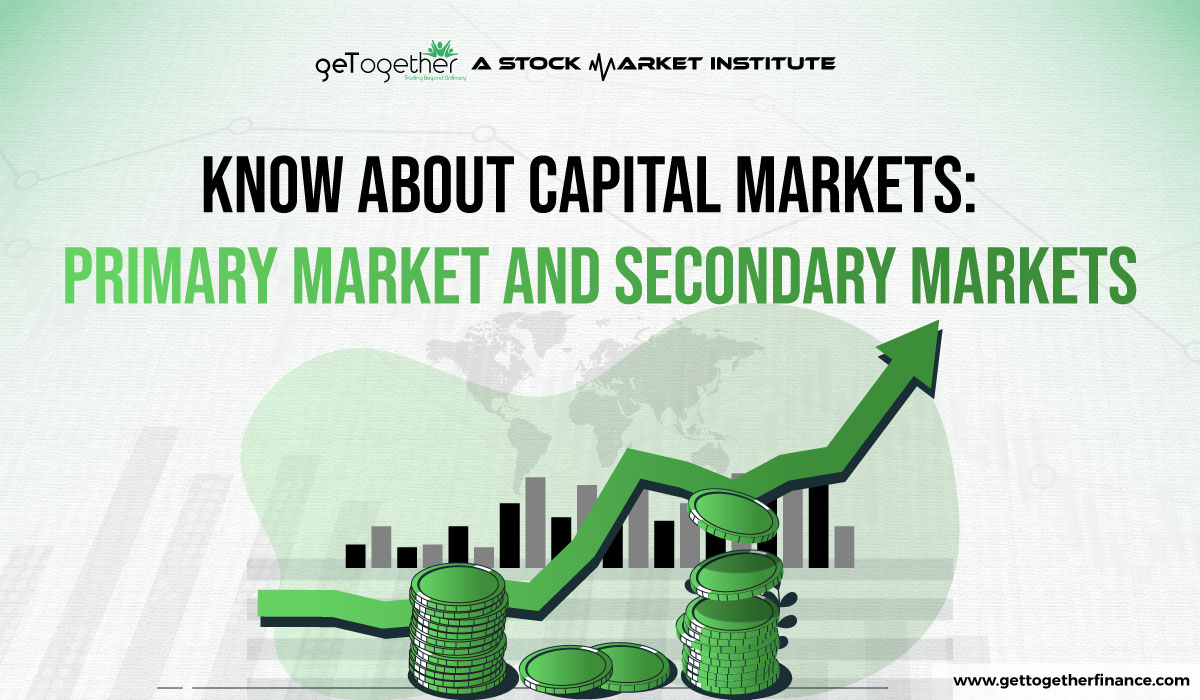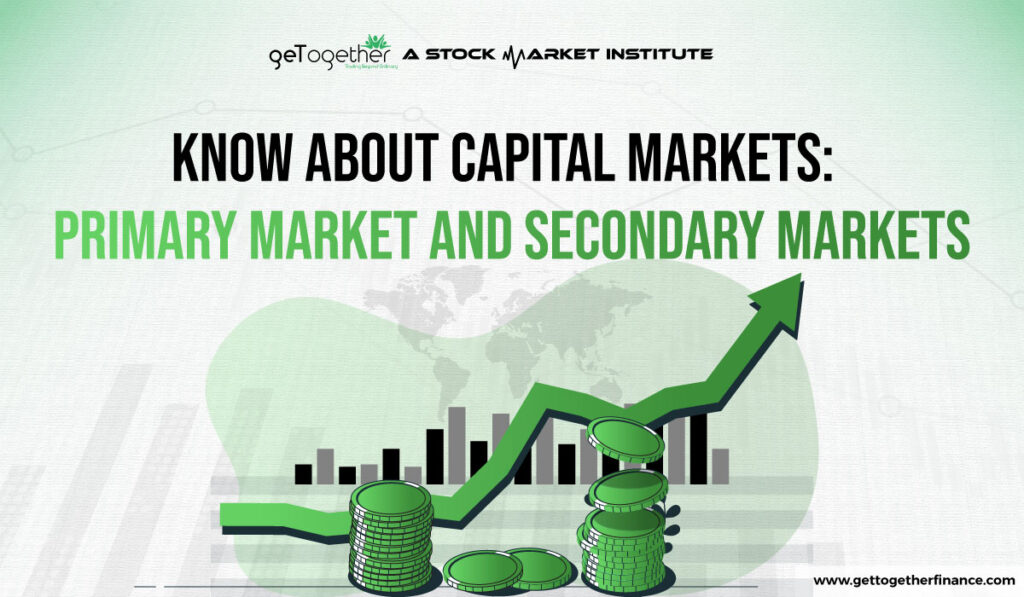Discover Capital Markets: Primary Market and Secondary Markets
- June 27, 2024
- 1005 Views
- by Manaswi Agarwal


When you make an exclusive purchase directly from a store of a product that was not offered to the public previously, the purchase is then made from the primary market. If you enter a shop to buy that same product, you have made it from the secondary market and not directly from the store or the brand. Similarly in the market of securities in India, the market is classified into two major segments which include primary market and secondary market while both of them have different functions.
Primary Market

The primary market in financial securities is a platform where equity shares, debentures, bonds are issued to the general public for the first time, this process is called Initial Public Offering (IPO). In this market, the exchange of securities is directly executed between the investors and the companies issuing the securities. It is identified as the best way for companies to raise capital from the general public. This market is often referred to as the “new issue market”. The is responsible for facilitating direct flow of capital from investors to the issuing entities. This market is further classified into equity and debt markets.
Equity Market
In the equity market, shares are issued to the public for the first time through an IPO, a company here offers a portion of ownership to the investors in exchange for capital. Companies have an opportunity to raise funds from the public to expand their business, research and development, debt repayment or other business activities.
Debt Market
In the debt market, debentures or bonds are issued by entities to raise capital. The entities take loans from the public for which periodic interest is paid by the issuer to the bondholders. Governments and corporations are highly dependent on the debt market to meet their financial obligation by borrowing from the investors.
Features of Primary Market

Let’s know about the primary market by enlightening its important features and functions to deeply understand the working of this market.
Capital Formation
Primary market allows companies to raise capital by issuing new securities to the public. The capital is essentially required by government or entities to finance various projects, expansion plans, and meeting operational needs.
Determining the Prices
The initial sale of securities in the this market helps in determining the fair market value. The issuing company can determine the issue. Several factors such as the company’s financial health, industry trends and overall market conditions are responsible for the fluctuations in the prices.
Facilitate Economic Growth
Raising funds from the public allows companies to expand and develop which contributes towards the economic development of the nation. The primary market contributes towards overall growth of the economy by encouraging employment, innovation and entrepreneurship.
Pros of Primary Market

This market offers various advantages to the investors which must be known to the market participants to increase their efficiency in the stock market.
· Companies can expand their business by raising capital and contribute to the economic growth and development of the country.
· Investors can gain potential returns from capital appreciation if the value of securities increases in the secondary market for exchange of securities.
· The prices are determined based on the demand and supply forces and several other factors initially which offers the advantage of transparent pricing.
Cons of Primary Market

Besides several advantages offered by the market, there are several disadvantages also which might affect the purchase and selling of securities.
· The primary market is prone to market risks and is affected by several factors such as economic downturns, industry challenges and geopolitical events. Investors must be aware of the market risks while investing in a business.
· In the initial stages, the performance of securities can be highly volatile, restricting investors to predict the outcomes and hence imposing certain challenges.
· Primary market does not allow enough liquidity to the investors as initially the investments are kept in a lock-in period which restricts investors from liquidating their investments quickly.
Secondary Market

Secondary market is a platform where already issued securities by the primary market are traded freely by the investors. The securities are exchanged among the investors without any involvement of the issuing entity.
Features of Secondary Market
The market is particularly designed for traders where they can have active participation in the stock market. The market allows retail investors to indulge in daily activity and be one of the major aspects of the secondary market.
Price Determination
The prices in the secondary market are determined by the demand and supply forces. Price is majorly affected by several factors like market sentiments, economic conditions, company’s management and financial performance, etc.
Liquidity
Secondary platform infuses liquidity in the market which allows investors to buy and sell the securities freely. Increased liquidity helps investors monetize their investments in a company.
Regular Trading
As compared to the primary market where securities are available for a short period only, the secondary market offers regular trading opportunities to the investors. Investors can buy or sell their securities at any time during market hours.
Pros of Secondary Market

Secondary market offers an easy implementation of buying and selling the securities as it is a liquid market where the transactions take place quickly and easily. In this market, investors can turn their capital assets into liquid very quickly. Also, portfolio diversification becomes easy as investors have easy access to a wide range of securities where they can invest. This lets them manage their risks efficiently by spreading risk into different assets.
Also Read: What is Share Market?
Cons of Secondary Market

The major disadvantage of the secondary market is that the stock prices are subject to rapid changes due to economic, political and several other factors that can cause the stock to face market volatility. It can result in significant losses to the investors. Apart from this, regular transactions in the secondary market are subject to various brokerage and transaction costs.
What is the difference between Primary and Secondary Markets?
Primary and secondary markets differ from each other in the world of financial securities. Let us clear the confusion between the two by understanding the basic differences.
| Primary Market | Secondary Market |
| The market enables companies to raise funds by issuing securities to the public. | Securities are exchanged among the investors which creates liquidity in the market. |
| The two parties involved include the company issuing the securities and the investors. | The exchange of securities takes place among the interested investors. |
| In the primary market, the securities are issued for the first time. | Securities are previously issued in the primary market. |
| The price is determined by the company issuing the security. | The prices of securities keep fluctuating due to demand and supply forces. |
Final Thoughts
Primary and secondary are the two markets that allow investors to take part in the business activities by investing in IPOs and being a retail investor through the secondary market. To master the stock market and learn about demand and supply theory which drives the market, you can enroll into GTF – Trading in the zone course.
FAQs
What is the Primary Market?
Primary market is a platform where the securities are issued by a company to the general public in order to raise funds for their business expansion. The securities are issued for the first time in this market.
What do you mean by Secondary Market?
The secondary market offers a platform to various investors to exchange their securities. Securities already issued in this market are traded by the investors.
What is an IPO?
An IPO is an Initial Public Offering made by the company to raise funds from the general public. A company can raise capital by diluting its ownership through an IPO.



 Instagram
Instagram 
